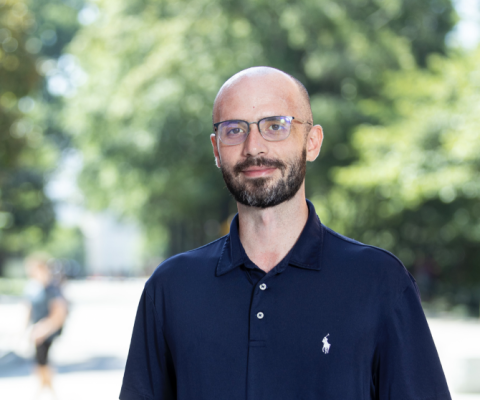
Allen Hyde is an Associate Professor in the School of History and Sociology at the Georgia Institute of Technology.
THIS LECTURE HAS BEEN CANCELLED AND WILL BE RESCHEDULED.
Speaker: Allen Hyde, Associate Professor in the School of History and Sociology at the Georgia Institute of Technology.
Abstract: Frontline coastal communities are under increased threat from intersecting disasters. Extreme weather events, such as hurricanes, heatwaves, heavy precipitation, and flooding are projected to rise in their incidence and overall severity over the coming decades due to climate change. Meanwhile, industries operating in ports are polluting the air and soil of nearby neighborhoods, and the negative health effects caused by industrial pollution can be exacerbated or redistributed by hurricanes and flooding. Through Youth Advocacy for Resilience to Disasters (YARDs), we seek to engage youth living in frontline communities in disaster resilience planning through mapmaking and advocacy through a cross-curricular STEAM program designed for middle school students. We designed a youth program because families are often busy with other activities, care work, and their employment that they can be difficult to engage; however, youth can be a gateway to access these busy families. Research has shown that engaging youth in advocacy can enhance disaster resilience. From 2021 to 2023, we implemented a 14-session curriculum that educates and empowers middle-school-aged participants to advocate for infrastructural improvements that can benefit themselves and their neighbors by learning about disaster resilience from the perspective of environmental justice and equity. Students then learn about the importance of civics and understanding power and representation in their community. The next module focuses on MapSpot, virtual mapmaking, and data to understand the assets and vulnerabilities in their communities related to disasters and climate. They then learn about green and gray infrastructure solutions to disasters. Finally, they develop an action plan and present their plan to local leaders (political and civic, including their families) that they have identified in their community to advocate for change. This curriculum has been piloted as an after-school program at a Title I school in Savannah and Chatham County's Public School System in the Fall of 2022 and twice as a summer camp in the summers of 2022 and 2023 at the Georgia Tech Savannah campus. Most recently, we ran the program as a 2-day camp in Cape Town, South Africa. This transdisciplinary and cross-curricular program includes elements and team members from diverse disciplines including sociology, urban planning, civil engineering, and digital media studies, as well as civic partners. We also refined and introduced a creative, accessible mapmaking tool, called Map Spot, to engage youth in data visualization and mapmaking to help make claims about disasters in their communities.
Bio: Allen Hyde is an Associate Professor in the School of History and Sociology at the Georgia Institute of Technology. He is a quantitative scholar whose main research areas are stratification and inequality, urban sociology, work and occupations, climate and disaster resilience, and immigration. He is currently researching the effects of race/ethnicity and immigration status on homeownership, social and demographic change in Clarkston, GA (known as the most diverse square mile in America), and a Principal Investigator for the Youth Advocacy for Resilience to Disasters Program research project funded by the National Science Foundation's Civic Innovation Challenge. He has also been a Principal Investigator for a National Science Foundation Innovation Corps (I-Corps) grant. He received his Ph.D. from the Department of Sociology at the University of Connecticut.
--
IPaT's fall 2024 lunch lecture calendar and lecture/talk (day of) streaming info can be found here: https://research.gatech.edu/ipat/lunch-lectures.
The IPaT: GVU Lunch Lecture Series is free and features guest speakers presenting on topics related to people-centered technologies and their impact on society. Lunch is provided at 12:00 p.m. and the talks begin at 12:30 p.m. Join us weekly or watch video replays.